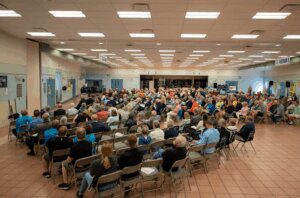Preservation of Local Control
Our state’s lakes are among our most treasured natural resources. They are critical to our local economies, many communities’ identities, and our quality of life. Healthy lakes stimulate tourism, increase property values, and enhance our wellbeing. Wisconsin Lakes recognizes the importance of letting communities decide how to protect their lakes through local ordinances.
 The right and responsibility to adopt boating ordinances was given to local communities through our state constitution’s Home Rule provision (Wis. Const. Art. XI, section 3). The process of developing ordinances is clearly outlined. Consequently, all Wisconsin ordinances are presumed “constitutional” and overturning them requires proof that there’s “no reasonable basis” for the ordinance.
The right and responsibility to adopt boating ordinances was given to local communities through our state constitution’s Home Rule provision (Wis. Const. Art. XI, section 3). The process of developing ordinances is clearly outlined. Consequently, all Wisconsin ordinances are presumed “constitutional” and overturning them requires proof that there’s “no reasonable basis” for the ordinance.
This long-standing right is under attack by politicians in Madison and special interest groups. They must not be allowed to further cripple local control of boating as they did with the waterskiing spotter rule. When local communities and law enforcement argued against eliminating a spotter, special interest groups claimed local communities could require a spotter to improve safety, but they would have to overcome a barrier of 750 hours of boat patrol. That effectively eliminated almost all lakes from requiring this safety measure.
Why do special interests want to cripple local control?
- They claim a “patchwork” of ordinances is confusing.
BUT it has always been the responsibility of the boater to understand the rules and regulations of a particular lake. Local ordinances are posted at every landing. Examples include: recreational hours, boating direction, slow-no-wake requirements for sensitive areas or high water, and distance from shore. DNR regulations vary by lake and are complicated and lengthy. - They claim that local ordinances are “unenforceable.” The evidence shows otherwise:
- Legal authority is established: Wisconsin law explicitly empowers towns to adopt and
enforce boating ordinances. - Voluntary compliance works: Once ordinances are enacted, boaters overwhelmingly follow
them. - No citations don’t mean no enforcement: It shows the rules are clear and effective.
- Enforcement tools exist if needed: Local officials, constables, boat patrols, or sheriffs can
enforce. - Compliance, not punishment: The goal is safer, healthier lakes — and communities are
proving it works.
- Legal authority is established: Wisconsin law explicitly empowers towns to adopt and
In reality, it is simply a power grab. Special interest groups don’t want the majority of residents in a community to limit their recreational enjoyment. Wisconsin Lakes understands that local communities carefully consider what is best for their lake. It is not an easy or arbitrary process to pass an ordinance.
Call to Action: An bill could be introduced soon that would cripple or eliminate local control of enhanced wakes. As of Aug. 20 there are 62 local ordinances regulating enhanced-wake recreation in Wisconsin; 57 of them (94%) follow the same framework. Contact your legislators and demand they maintain robust local control of boating.
Find your Legislators: WSL – Click HERE to Find Your Legislator

